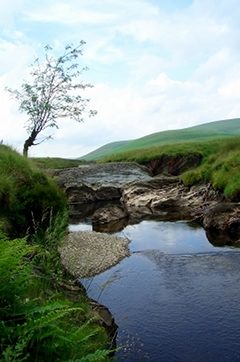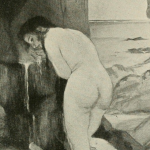Wales is so beautiful! And what a strange language they speak! But what else? Wales and England exchange letters about their countries, their stereotypes and their common history.
Welsh Letter

Dear Lauren,
The first question that came to me when thinking about the relationship between Wales and England is: how separate are we really? There is a significant reason why Wales and England are commonly associated closely with one another – a common government and judicial system. Unlike the Scottish Parliament, which can make its own laws in various areas such as education using power devolved from Westminster, all ‘measures’ proposed by the National Assembly of Wales are subject to the scrutiny of the Parliament of the United Kingdom, so we both live under a united law.
Yet this relationship was not established without a great deal of historical trouble. After the Roman invasion of Britain in AD 43, rulers of England who tried to extend their control over Welsh territories were for a long time unsuccessful. None were able to unite Wales with England for long. Eventually the Norman conquerors of England ensured that the Welsh kingdoms came gradually under the sway of the English crown. In 1282 the death of Llywelyn the Last, the last Welsh king, led to the conquest of Wales by King Edward I of England; afterwards, the heir to the English throne bore the title ‘Prince of Wales’, and still does so to this day. During the 14th and 15th centuries the Welsh were still very unhappy about English ‘colonialism’ in Wales. They launched several revolts against English rule, the last significant one being that led by Owain Glyndŵr. In the 16th century Henry VIII passed the Laws in Wales Acts to incorporate Wales fully into the Kingdom of England. Under England’s authority, Wales became part of the Kingdom of Great Britain in 1707 and then the United Kingdom in 1801. Yet despite the extremely determined attempts of the English to quash Welsh culture and traditions in past centuries, the Welsh retained their language and culture in spite of heavy English dominance. Perhaps this is also the reason why retaining the Welsh National Assembly government today is so important to us, despite the lack of power in practice. The Welsh Political party, Plaid Cymru, represents Welsh values and the Welsh identity.
The Welsh are known to be very proud of our language – and with good reason.

The Welsh are known to be very proud of our language – and with good reason. Wales has a wealth of its own literary and musical heritage, ranging from Cynghanedd poetry to hymns such as ‘Calon Lan’, the meanings of which would be lost without the preservation of Welsh, an individual and distinctive language which sounds homely to me. The publication of the extremely significant first Welsh translation of the Bible by William Morgan in 1588 greatly advanced the position of Welsh as a literary language. Our separate languages are a factor which contribute to the divide between the cultures of Wales and England. Very few English people can understand Welsh, and consequently the Welsh language gives us a sense of community that excludes the English.
Even aside from the language, I am sure that it is as obvious to you as it is to me that being English and being Welsh are very separate identities. We are proud of our respective, and separate, flags, national anthems and patron saints. It becomes apparent when we customarily dig out the spirit of old rivalry at certain times of the year, when we face sporting events such as the Ashes (international cricket tournament) or the Six Nations (international rugby tournament), or when we root furiously for different candidates in the national talent competitions, such as the singers on the X Factor. I recently came across a video which a Welsh person made about the differences between with English and Welsh, in good humour, which I thought you might be interested in watching.
Something I found surprising while thinking about this subject is how shallow our understanding of each other’s cultures really is. I mentioned the Eisteddfod, the annual Welsh celebrations for St. David’s Day, to somebody from south-east England two weeks ago, and it was obvious that they had never heard of it. On the 1st of March every year, national competitions in music and literature used to be held across Wales, called the Eisteddfod. Nowadays this practice is reflected in Welsh schools, when lessons are suspended for a day and competitions are held throughout the day. In particular, the highlight of the day is the crowning of the Bard, the title given to the writer of the best poem submitted before the day. The famous incident of the national Bard, Hedd Wynn (Ellis Humphrey Evans), who died in the First World War in Flanders before the crowning ceremony, is still remembered. In that year, 1917, the Bardic chair was draped with a black cloth. Conversely I’ve been wondering how much I know about the English celebrations on St. George’s Day, and I’m ashamed to say that I know very little. Perhaps you are in a good position to enlighten me.
I would suggest from my experience living in Wales that there remains little hostility now between the Welsh and English people. I do feel, however, that many English people tend to stereotype the people of Wales as nosy eccentrics with heavy unintelligible accents, living in a country which has nothing but grass and sheep. Perhaps the stereotype has been altered, or enhanced, by the recent comedy TV series Gavin and Stacey about an Essex boy and a Welsh girl who fall in love – I would be very interested to hear your thoughts on this. The stereotype is typically grossly inaccurate. The most urban and vibrant cities in Wales, such as Cardiff and Swansea, hum with activity, while Wales also has the benefit of great areas of rural landscapes. An overreliance on the stereotypical perception from the English, when mixed perhaps with the subconsciously arrogant viewpoint that the English are superior and Wales is a peripheral country, quickly becomes a source of aggravation and annoyance to us. In fact, there are no obstacles to reconciliation, except a lack of understanding and mutual respect.
I think it would be fairly accurate to say that the alliance we share in Wales and England today works pretty well. Unity through a common government and law in our two countries is mutually beneficial, but there must always be space for us all to embrace the independence of our cultures and our identities. I will always feel a degree of indignation against people outside the UK who do not know that there is a difference between England and Britain. But on the other hand, at times such as the Olympics, we will all cheer as loudly as each other as the Union Jack is raised above the podium.
With friendly wishes from Wales,
Sidi Bai
England’s Answer
Dear Sidi,
I’m quite ashamed to say that I’ve never been to Wales. I’ve visited destinations across Europe and America, but have failed to venture across the border to my closest neighbouring nation. Perhaps this makes me an ideal candidate to talk about the misconceptions and stereotypes that arise from a lack of real knowledge!
We might have had a common government under Roman rule, but after the Anglo-Saxon invasion, British culture began to divide again — the Welsh and English were separate groups. The misguided notion of Wales as an inferior country is rooted in military history. King Edward I of England conquered Wales in 1282, bringing it under the power of the English crown for the first time. There were several Welsh revolts against English rule, and it was not until Henry VIII’s reign that the full union of our two nations was achieved under the Laws in Wales Acts. I wonder whether the king’s ancestry had anything to do with this — the Tudor dynasty originated in the medieval Welsh principality of Deheubarth. These laws effectively abolished any legal distinction between English and Welsh, but as you’ve pointed out, we’ve maintained a strong sense of our separate cultural identities.
We’ve had different patron saints, for example, for centuries. I was surprised to learn of your celebrations for St. David’s Day; St. George’s Day seems to pass largely unnoticed in England, so I’m afraid I join you in knowing little about any annual celebrations! Between the 15th and 18th centuries, St. George’s Day was a major national holiday, almost on a par with Christmas, but the flying of the English flag is all that connects us to St. George these days. Do you think it’s unfortunate that the patron saint of England is mythically depicted slaying a dragon, rather like that emblazoned on the Welsh flag?
Stereotypes about the English seem to be based on an idealised version of England, circa 1910: cream teas, morris dancing, bowler hats, cricket, to name a few. We are always thought of as talking endlessly about the weather—I assure you we have other conversation topics! Seemingly endless rain, however, is a fairly accurate association with England (and something we share with Wales, of course).
It was only in the latter half of the 20th century that separate identities were formally recognised with administrative devolution, and this has been the cause of tension for some. A point of contention for young people is the difference in university tuition fees. As I’m sure you know, Welsh universities are able to charge higher fees for students who are not from Wales, and I must admit I think this is a little unfair, given that Welsh students and English students pay exactly the same at universities in England.

I’m glad you mentioned Gavin and Stacey, the comedy drama that brings together two families from Barry Island, Wales and Essex, England. The great thing about the show (whatever you think of its comic value) is that it isn’t simply an English programme peddling Welsh stereotypes. Neither it is a Welsh programme making generalisations about the English. It neatly captures the way in which both sides of the extended family see each other. While the loved-up young pair see their different origins as entirely irrelevant, their parents find it rather more difficult to brush differences aside, and arguments sometimes descend into an exchange of offensive clichés. This exposes a wider reality. For older generations, stereotypes seem to lie under the surface, only to be used when they feel threatened—my father’s Welsh jokes are only voiced during England v. Wales rugby matches! As you said, though, all is forgiven when we compete alongside each other as “Team GB” in the Olympics. The relationship between our two countries is amicable these days, and I think that whilst we retain important cultural distinctions, nationality is becoming less and less of a divisive label for young people in Britain.
Best wishes from England,
Lauren
Cover photo: Les Haines (flickr), Licence: CC BY 2.0









